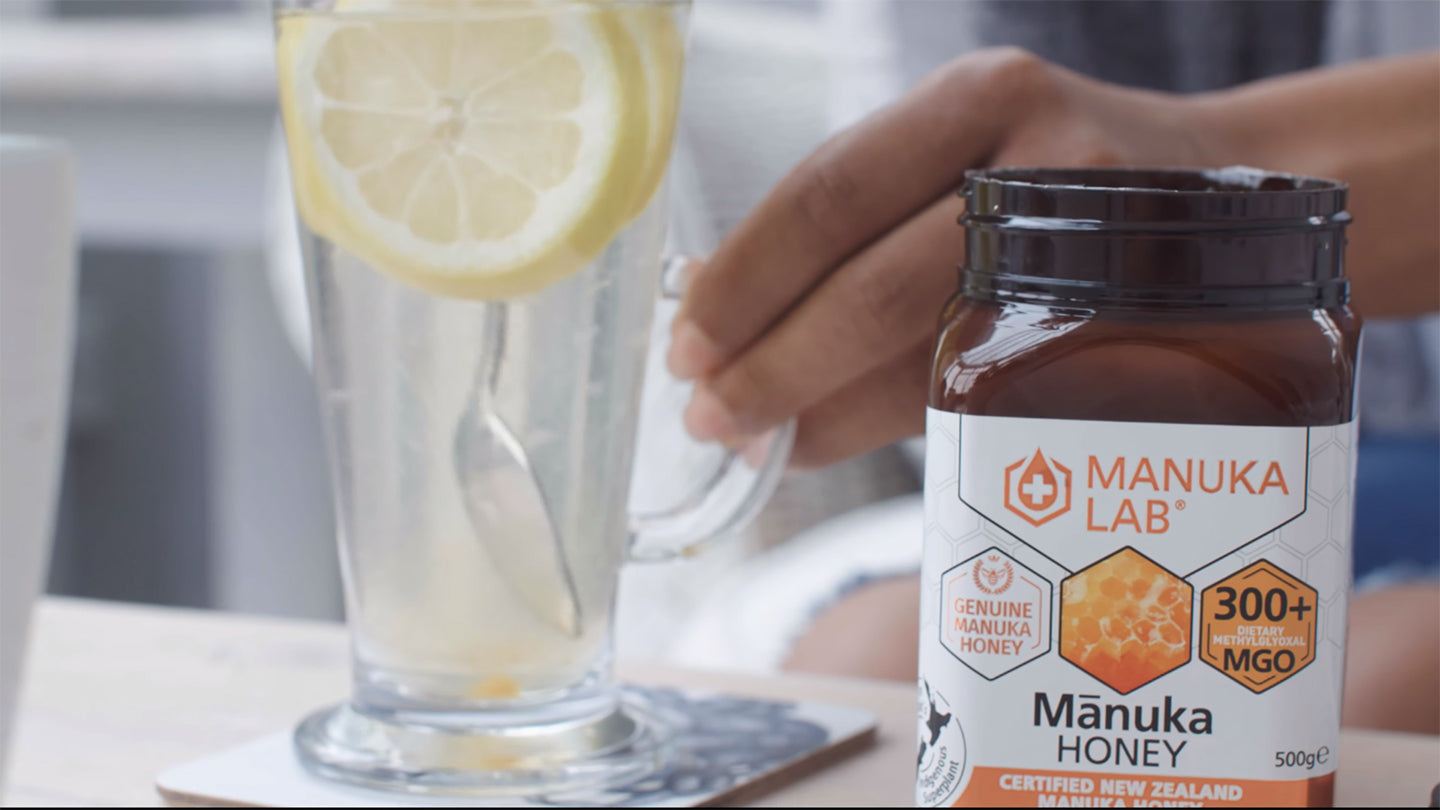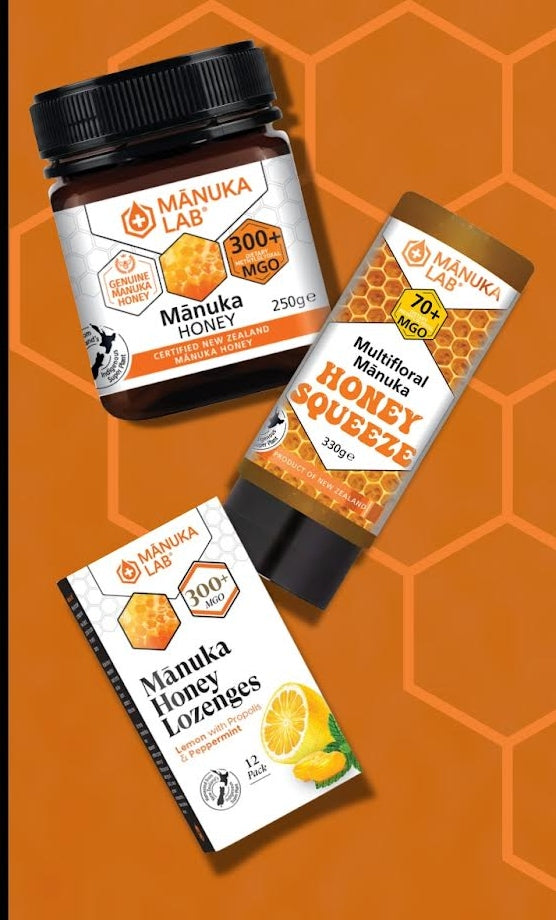

The start of autumn, though conjuring beautiful imagery of falling leaves and cosy feelings, also sees the days turn dark and illnesses passed around. Commonly known as prime ‘cold and flu season’ the coming months will see many of us suffer immune-effecting illnesses that sap our energy – the last thing we need after what occurred in 2020!
To beat these blues, some of us will turn to the shelves of our local retailers for supplements that say they provide the energy boost we need to get us through.
Here, we’re going to tell you why Manuka is so revered, as well as giving you other tips on maintaining your immunity against the weather this autumn/winter.

How Can Manuka Honey Help Support Cold Weather Immunity?
Aside from its studied effects (more about this soon), one of the other reasons Manuka is so highly praised is because of its versatility in providing support to a wide array of ailments. It is used to support immunity*, strengthen hair, assist the healing process of broken skin – Manuka Honey wound cream and dressings are even used in NHS hospitals and clinics such is their effectiveness[i].
In 2018, health professionals in England recommended that honey should be used to ease the effects of cold and flu, rather than suffers turning to their GP’s and prescription antibacterial medicine. One of the reasons for this advice was that antibiotics do not have any effect on cold and flu bugs. With its sweet, rich taste, honey is well-placed to act as a natural soothing agent for stuffy noses and sore throats – but not all honey is created equal, however.
Manuka is native to New Zealand’s North Island and contains unique chemical markers that aren’t naturally occurring in any other type of honey. Other honey relies on Hydrogen Peroxide for their potential benefits, but it can be affected by several different factors, including time, light and processing. The positive effect of Manuka is more stable than other honey types due to the presence of Methylglyoxal (MGO) – this chemical has been studied to be far more beneficial to health[ii].
It's important to stress that while Manuka Honey isn’t a cure, its unique chemical structure makes it by far one of the best ways to soothe symptoms of cold and flu. Together with several other measures you can take, you will have a strong defence against those bothersome bugs – so let’s take a look at what else you can do to build your immunity!
Which Grade Of Manuka Honey Is Best?
Methylglyoxal (MGO) also measures the grade of antimicrobial activity within the honey. Grades higher than 300MGO have a higher than average level of antimicrobial activity, which means that a teaspoon’s worth in lemon and hot water will help to soothe the effects of a sore throat.From Manuka Lab, you will find our honey ranges from daily use 40MGO all the way to high-grade 700 or 850MGO honey. The grade of honey you choose is all down to personal choice, whether you want your honey as a daily immunity support, or a soothing addition to your tea break!

5 Cold Weather Immunity Tips
-
Manage your stress levels. Emotions caused by stress will consume lots of your energy, potentially leading to a breakdown of immune protection. Managing your stress, simply by finding things you find relaxing will keep stress at bay, strengthening your immunity.
-
Exercise. Exercising doesn’t just help us to be fit and healthy, but it can also help us to relax and sleep more soundly too. Even something like a brisk walk for half an hour a day can help the body to reduce hormones that are commonly linked to stress[iii] – so you don’t even need to join a gym to feel the benefits of exercise!
-
Sleep properly. Sleeping is just as important to your health as keeping active. Imagine you’re a mobile phone that was on 1% battery and you ‘woke up’ on 50% - you’re not going to last all day, are you? Sleeping works the same way for our bodies; it recharges us, ready for the challenges of the day ahead. Around 7 hours sleep a day is widely considered as being the optimal amount to avoid burnout and fatigue; factors that play into a weak immune system.
-
Drink enough water. One of the main reasons (aside from a lack of sleep) that the body experiences fatigue is because it isn’t hydrated enough. We need water to fuel the body, to keep all the parts functioning as they should – so make sure you hydrate throughout the day, as well as before, during and after exercise.
- Don’t overwork. A lack of energy and an upturn of stress (two key factors in immunity breakdown) can be caused by a person’s tendency to overwork. Be it through our jobs, our home life or any social obligations, we can give too much in these activities, without giving ourselves enough back. Make sure you balance them out with enough relaxation, hydration and sleep – remember you won’t be able to help anyone if you are struggling to keep up.
Those were 5 quick tips on protecting your immunity over the autumn/winter. If you would like to try Manuka for yourself in the coming months, why not browse our range of products? Here at the Manuka Lab, we are leading providers of Manuka Honey in the UK – offering a range of genuine, high-quality immunity-protecting items for great value prices.
Shop Genuine Manuka With Us!
Our genuine New Zealand Manuka honey is sustainably harvested from New Zealand’s indigenous ‘Super Plant’ grown in the remotest areas of the East Cape region, ensuring quality, potency and origin. Our MGO 40+ Multifloral Manuka Honey (with a twist of natural fruit extract) is perfect to use as a super tasty sweetener to include in your daily diet for everyday health and wellbeing
Please take the time to browse our selection – each clickable product page contains specific information about each item; their uses, ingredients and more. If you have any questions about them or on any aspect of Manuka Honey, we would be pleased to hear from you! Send us an e-mail at wecare@manukalab.co.uk
________________
*Manuka honey supports immunity alongside a healthy diet.
[ii] https://www.ncbi.nlm.nih.gov/pmc/articles/PMC6613335/
[iii] https://www.health.harvard.edu/staying-healthy/exercising-to-relax



